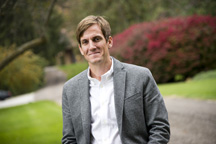3,080-mile race’s research to focus on runners’ response to extreme physical activity
October 21, 2014
 |
|
Bryce Carlson |
WEST LAFAYETTE, Ind. - Cardiovascular health, nutritional status and stress on the body are some of the human conditions under study during a 3,080-mile race in 2015.
Purdue University anthropologist Bryce Carlson is among the 12 runners in the 2015 Race Across USA and will be directing research objectives that are part of this charity event to promote childhood fitness. Starting in Huntington Beach, Calif., on Jan. 16, the 12 participants will run a little over 26.2 miles per day from California to Maryland. The entire journey is about 3,080 miles, or the equivalent of running more than 117 marathons.
“Humans adapt to stress differently than the rest of the animal kingdom in that we rely on culture and technology as well as biology,” said Carlson, an assistant professor of anthropology who studies nutrition and human evolution. “Our species has developed technology allowing us to climb Mount Everest and dive to the Mariana Trench, and we also adapt biologically when our cultural systems don’t completely buffer us from those stresses. Over the course of running more than 3,000 miles, we want to see how runners modify their behavior and use technology to minimize stress on the body and promote its ability to adapt.”
Carlson will focus his research on biocultural adaptation, specifically nutrition. He’ll evaluate if and how the runners modify their diets in the context of physical and mental stress by evaluating nutritional quality, use of supplements and changing food preferences.
Researchers from Boston Children’s Hospital, University of Washington, Harvard University, Massachusetts General Hospital, Grand Valley State University, Hunter College – City University of New York, Loyola University, Gettysburg College and University of Calgary are participating in the various studies. Research topics include energy balance, gastrointestinal distress, biomechanical form and injury, micobiome adaptation, cardiovascular health, sleep patterns, and sports psychology.
“Each arm of the research project will examine how the biological or psychological systems are stressed throughout the run, what behaviors or technologies modify that stress, and, ultimately, the limits of what our bodies and minds are capable of adapting to before breaking down,” Carlson said.
Support for these studies is from ongoing funding for the scientists’ projects and their participating institutions.
The 12 runners will be camping or staying at community organizations, such as churches or youth hostels, throughout the race. Including Carlson, there are 11 males and one female racing. They represent a variety of backgrounds including a teacher, sales executive and fitness advocates.
“This is a major challenge and an adventure for us runners,” Carlson said. “For many of us it will be the hardest and most exciting thing we’ve done - or will do - in our lives.”
The race will cover 140 days, and the runners will have days off for muscle recovery and to visit area schools to promote the 100 Mile Club program. The goal of Race Across USA is to raise money and awareness for childhood activity and encourage schools to sign up for the 100 Mile Club program, which supports opportunities to run or walk 100 miles at school each year.
“The consequences are significant when schools cut physical education and health,” Carlson said. “Our children are increasingly graduating high school overweight or obese, and suffering early onset disease such as diabetes. These 17- and 18-year-olds are just now becoming adults making their own decisions and are already in health debt. We will be meeting with elementary schools to create a different dialogue: exercise, especially running, is something you want to do because it is fun.”
Participants will run in California, Arizona, New Mexico, Texas, Louisiana, Arkansas, Mississippi, Alabama, Georgia, South Carolina, North Carolina, Virginia and Maryland. They also will stop at the White House on day 139 of the 140-day event.
Carlson will be released from teaching in the Department of Anthropology during the spring semester 2015 to take part in the event. He is a member of Purdue's Ingestive Behavior Research Center.
Writer: Amy Patterson Neubert, 765-494-9723, apatterson@purdue.edu
Source: Bryce Carlson, bryce@purdue.edu
Related website:

